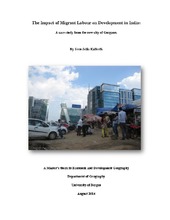| dc.contributor.author | Kallevik, Sven Selås | eng |
| dc.date.accessioned | 2014-11-27T09:54:10Z | |
| dc.date.available | 2014-11-27T09:54:10Z | |
| dc.date.issued | 2014-09-01 | eng |
| dc.date.submitted | 2014-09-01 | eng |
| dc.identifier.uri | https://hdl.handle.net/1956/8793 | |
| dc.description.abstract | I utviklingsland har det lenge vært en trend at i hovedsak enslige migranter deltar i den ekstensive den rural-urbane migrasjon. Med enslige migranter er det her ment migranter som reiser uten familie eller annet følge. Dette fenomenet vil bli satt i fokus og utledet i denne oppgaven. I India, som i andre land, spiller migranter en sentral rolle i den urbane arbeidsstyrken. De tilbyr en billig, pålitelig (i form av at de er så mange) og lett tilgjengelig tjeneste. Denne oppgaven vil legge vekt på hvordan lavt utdannede arbeidere mestrer livet i et urbant miljø. Videre, ved hjelp av Problemstilling I, vil det bli greid ut om hvorfor migranten velger å migrere, og hvorfor de i de fleste tilfeller ikke tar med seg familien. Det vil også bli diskutert, ved hjelp av Problemstilling II, hvordan lavt utdannede migranter bidrar til den økonomiske utviklingen av India. Er det lave lønnsnivået gunstig med hensyn til fattigdomsbekjempelse eller er det utelukkende en utnytting av migrantene fra arbeidsgivers side? Oppgaven er baser på kvalitativt innsamlede data som dybde-intervjuer og observasjoner gjort i felt komplementert av en ekstensiv spørreundersøkelse (n=72) gjennomført av forfatteren. Forfatteren har intervjuet lavt utdannede arbeidere på gatene i Gurgaon og i forstads Delhi. Ut i fra dette ble det klart at det er en overenstemmelse om at de lavt utdannede migrantene ikkje tjener nok til å brødfø en hel familie i et urbant miljø. På den andre siden, tjener de mer i byen enn de gjør i landsbyen, om de tjener noenting som helst. Mange ganger pekte informantene på den mangelfulle tilgangen på arbeid på landsbygda hvor mesteparten av familien praktiserer subsistens jordbruk. Når det gjelder utvikling kom det klart frem at arbeidsmigrantene tilbyr betydelige bidrag til utviklingen som forgeår i dagens Gurgaon. Mahatma Gandhi National Rural Employment Guarantee (MGNREGA) er et nasjonalt program satt i stant for å hjelpe til sysselsetting av arbeidere i ikke-jordbruksrelaterte jobber i det rural India. Effektene av dette vil også til en viss grad bli tatt opp i denne oppgaven. | en_US |
| dc.description.abstract | In developing countries it has for long been the trend that only single migrants participate in the extensive rural-urban migration. With single migrants it is here meant migrants moving without bringing their family along. This exact phenomenon will be elaborated and enlightened in this thesis. In India, as well as in other countries, migrants play an integral role in the urban workforce. They offer a cheap, reliable (in the sense that they are many) and easy accessible service. The thesis put emphasis on how low-skilled labourers cope with life in an urban setting. Furthermore, through Research Problem I, it will be elaborated several reasons why these migrants choose to make the move, and why they in most cases do not bring their families along. It will also be discussed, through Research Problem II, how low-skilled migrants contribute to the economic development witnessed in contemporary India. Does the low wage received by urban migrants help poverty alleviation or is it purely an exploitation of the migrants by the employers? The thesis builds on qualitative collected data as in-depth interviews and on site observations, complemented by an extensive survey (n=72) undertaken by the author. The author has interviewed low-skilled labourers on the streets of Gurgaon and sub-urb Delhi. From this it became clear that there is a general agreement that the low-skilled labourers do not earn enough to make a living for a whole family in an urban situation. Then again, they earn more in the city than they do on the countryside, if they earn anything at all. It was many a time pointed to the lack of sufficient work opportunities in the countryside where most families practice within subsistence farming. In respect to the aspect of development the labour migrants was found to offer a significant contribution to the development occurring in contemporary Gurgaon. Mahatma Gandhi National Rural Employment Guarantee (MGNREGA) is a national government scheme put together to help employ villagers in non-agricultural sectors. The effects of this will to some extent also be elaborated in this thesis. | en_US |
| dc.format.extent | 2782000 bytes | eng |
| dc.format.mimetype | application/pdf | eng |
| dc.language.iso | eng | eng |
| dc.publisher | The University of Bergen | eng |
| dc.subject | migrant | eng |
| dc.subject | Labour | eng |
| dc.subject | Migration | eng |
| dc.subject | Development | eng |
| dc.subject | India | eng |
| dc.subject | Gurgaon | eng |
| dc.subject | labor | eng |
| dc.title | Migrant Labour and its impact on development in India.A case study from the new city of Gurgaon | eng |
| dc.type | Master thesis | en_US |
| dc.rights.holder | Copyright the author. All rights reserved | en_US |
| dc.description.localcode | GEO350 | |
| dc.description.localcode | MASV-GEOG | |
| dc.subject.nus | 733111 | eng |
| fs.subjectcode | GEO350 | |
